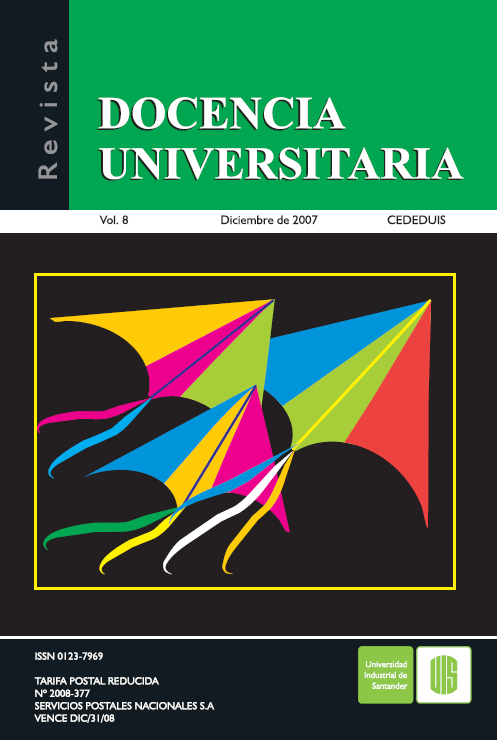Published 2007-07-02
How to Cite
Abstract
RESUMEN
El texto presenta la deontología o ética profesional, como parte de la ética general, desde donde se desprende la norma ética en la práctica profesional, aquí se hace referencia particularmente a la educativa. Debido al resquebrajamiento o crisis de la moral en detrimento de la ética, surge la necesidad de reflexionar y especificar los principios básicos que fortalezcan la práctica profesional. Se plantea que puede ser que resulte un tanto idealista esperar un cambio de conducta con sólo enseñar una deontología, para lo cual se apela al criterio empleado para juzgar las acciones como buenas o no tan buenas, a partir del concepto que de esto se tenga; es decir, de la noción de lo ético. Noción que se fortalece con el conocimiento de la naturaleza de la virtud y de su lugar en la personalidad humana. Es desde aquí que se considera, que tener un mejor entendimiento deontológico de la propia profesión permitiría despertar la conciencia y así querer mejorar en la práctica profesional. En el desempeño de una profesión tener conciencia permite conocer si se está o no en el camino apropiado para lograr el fin de la actividad que se realiza.
Palabras clave: Deontología, potencias humanas, tenencia: intelectual, volitiva, económica.
SUMMARY
The text presents the deontology or professional ethics like part of the general ethics, since where the norm is removed in practice professional ethics particularly refers to the educational practice. Due to the cracking or crisis of the moral in detriment of the ethics, the need to reflect comes up and to specify the basic principles that fortify the professional practice. It is formulated that can be result idealist to expect a change of conduct with only teach deontology, for which is appealed to the employed criterion to judge the actions as good or not so good, from the concept that of this we have; that is to say, of the notion of the ethical thing. This notion is fortified with the knowledge of the nature of the virtue and of its place in the human personality. It is from here that is considered that to have a better deontological understanding of the own profession would permit to stir the conscience and thus want to improve in professional practice. In the performance of a profession to have conscience permits to know if it is or not on the road appropriate to achieve the end of the activity that is carried out.
Keywords: Deontology, human powers, intellectual, volitive and economic possession.
Downloads
References
- AUER , A. El cristiano en la Profesión (Barcelona: Herder, 1970)
- BARCENA, Fernando. ‘Explicación de la educación como practica Moral’. En Revista Española de Pedagogía 1991, num. 183, p. 249-250.
- BLAKE , Hermann.. “The Challenge of Diversity” in Ethics and Higher Education (New York: Macmillan, 1990).
- CARDONA, C. Ética del quehacer Educativo (Madrid: Rialp, 1990).
- GADAMER, George H.. La razón en la época de la ciencia (Barcelona: Alfa).
- GICHURE, C.. La ética de la profesión docente: Estudio Introductoria a la deontología de la educación (Pamplona: EUNSA, 1995).
- GONZALEZ-SIMANCAS, J. L.. Educación: Libertad y Compromiso (Pamplona : EUNSA 1992).
- GUSDORF, Georges. ¿Para qué los profesores? (Madrid: Edicusa, 1969).
- LOCKE, John. Some Thoughts Concerning Education editado por J.W. y J. S. Yolton (New York: Clarendon Press, 1989).
- MACINTYRE, Alasdair. After Virtue: A Study in Moral Theory (Notre Dame Indiana: Notre Dame Press, 1984)
- ______________ . Three Rival Versions of Moral Enquiry: Encyclopedia, Genealogy and Tradition, (Notre Dame: University of Notre Dame Press 1990).
- MILLÁN-PUELLES, A.. “La Educación y sus Mascaras” (discurso).
- NAVAL, Concepción. Educar Ciudadanos (Pamplona: EUNSA, 1995).
- OTERO, Oliveros F. La Educación como rebeldía (Pamplona: EUNSA, 1980).
- PEINADOR, Antonio. Moral Profesional (Madrid: BAC, 1962).
- PIEPER, Josëf . Las Virtudes Fundamentales (Madrid: Rialp, 1976)
- POLO, L. ‘Tener y dar’ en Estudios sobre Laborem Exercens (Madrid: BAC 1987).
- POLO, Leonardo. ‘La Vida Buena y Buena: una confusión posible’ en Atlántida Vol. 2 num. 7, 1991.
- POLO, Leonardo. ¿Quien es el hombre? (Pamplona: EUNSA 1991). Santo Tomas de Aquino Suma Theologica I-II (Madrid: BAC, 1966).
- SHILS, Edward. ‘The Academic Ethos’. En American Scholar XLVII (2) 1978.
- SOKOLOWSKI, R.. ‘Fiducial Relationships: Philosophical and Cultural Aspects’. In Ethics, Trust and the Professions (Washington: Georgetown University Press, 1991).
- Statement on Professional Ethics del Association of American University Professors, Appendice A. En Handbook of the American Association of University Professors, editado por Louis Joughlin (Wisconsin: University of Wisconsin Press, 1967).
- YEPES, Ricardo & ARANGUREN, Juan. Fundamentos de Antropologías. Un ideal de la excelencia humana. (Pamplona: EUNSA, 1999).

